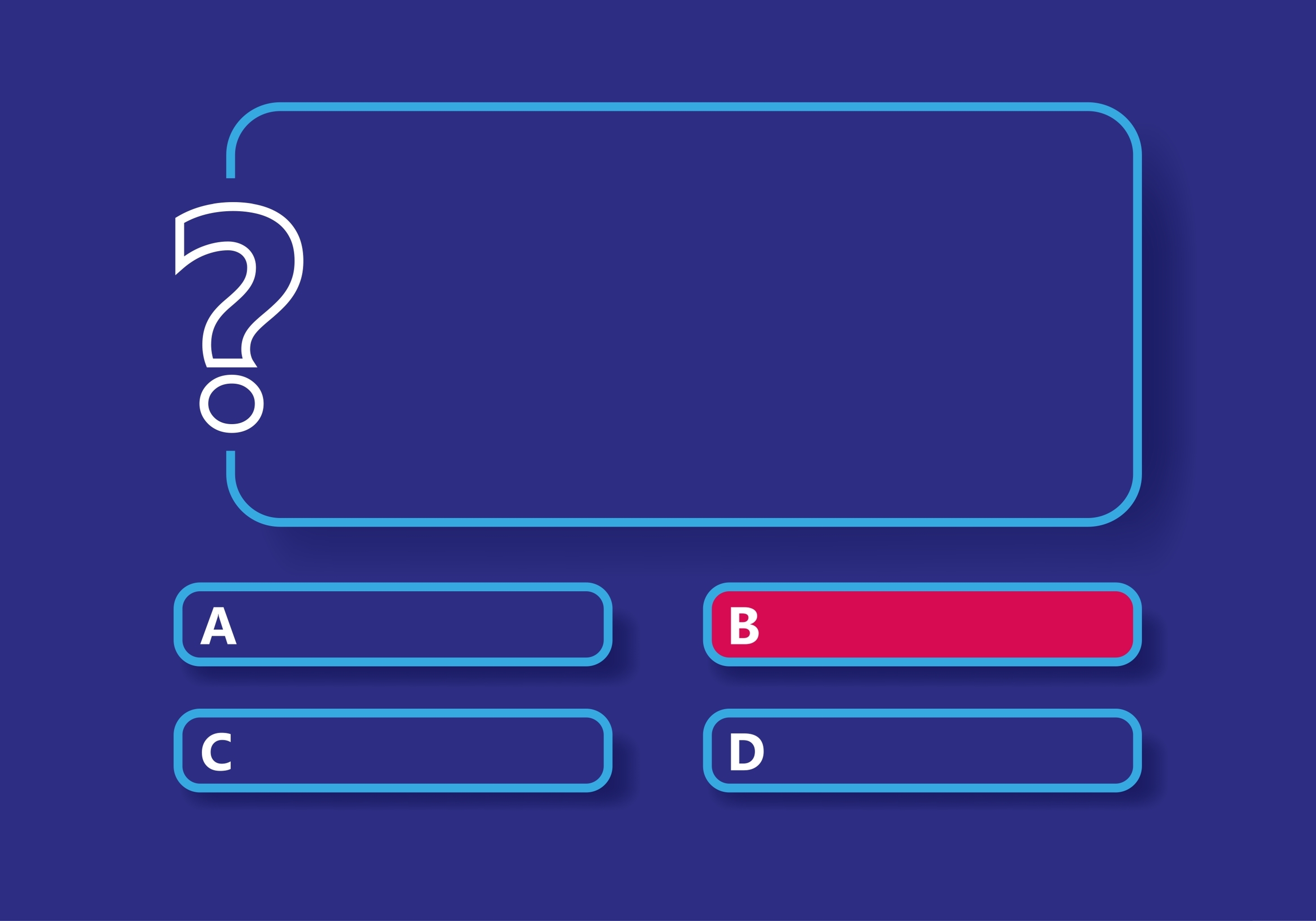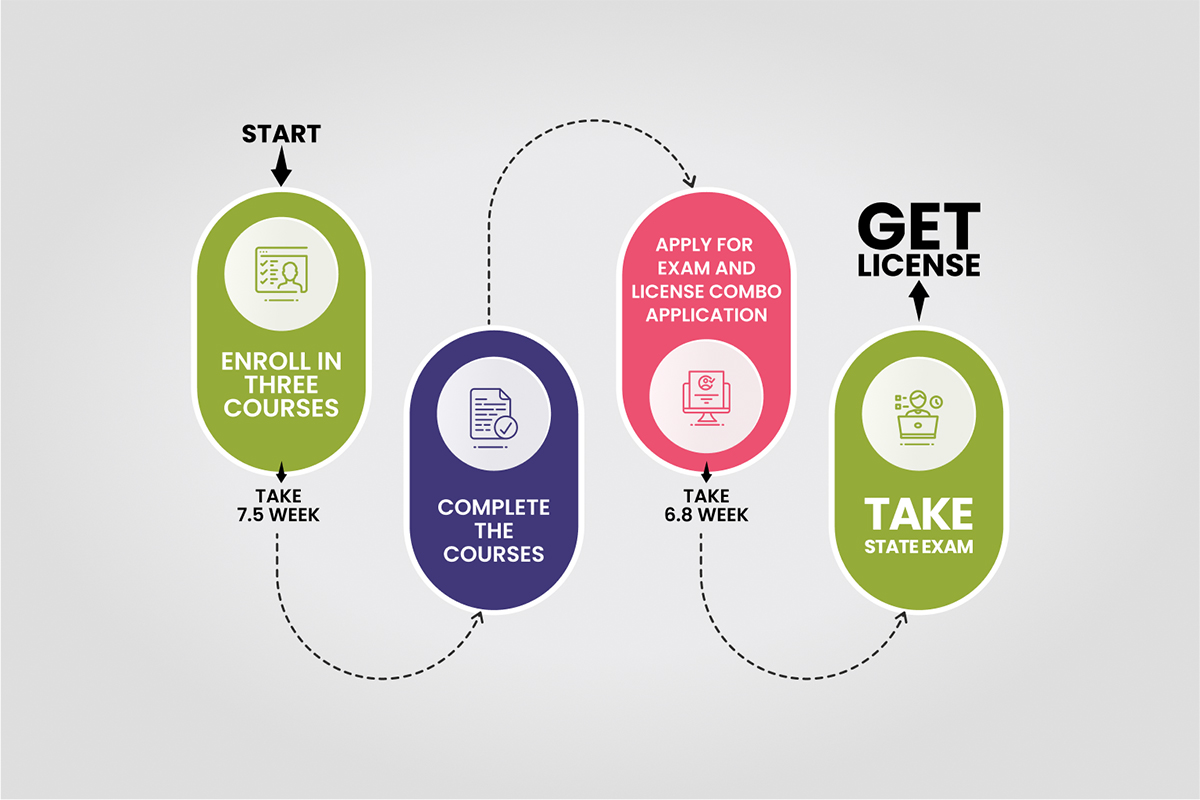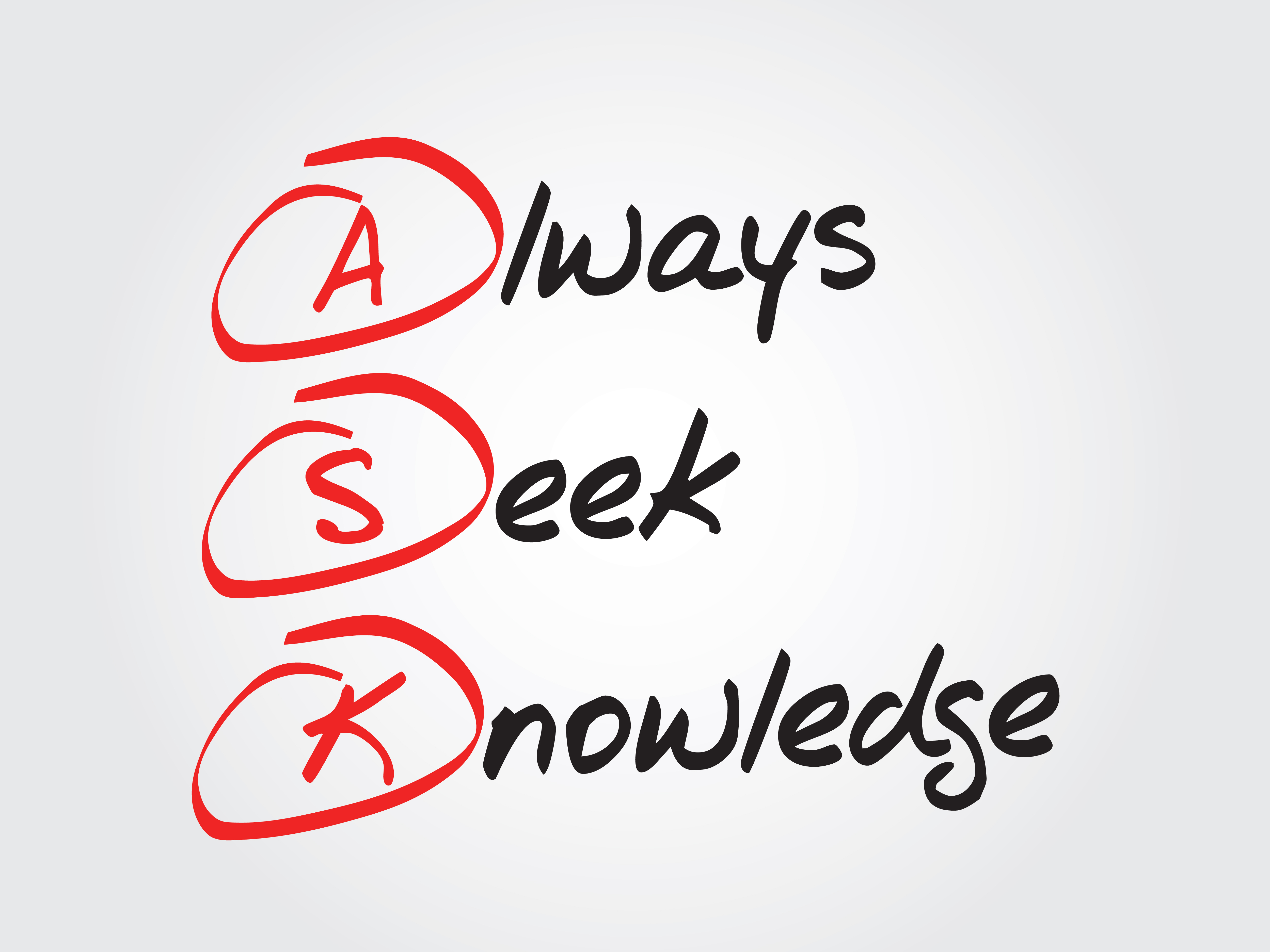
Is the California Real Estate Exam Multiple Choice?
If you're considering a career in real estate in California, attending a California real estate school will prepare you for an important milestone: Read more...
Is the California Real Estate Exam Multiple Choice?
If you're considering a career in real estate in California, attending a California real estate school will prepare you for an important milestone: the California real estate exam. Many aspiring agents ask: "Is the California real estate exam multiple choice?" This is often asked alongside the question of “How hard is the California real estate exam?”
Let's examine the exam's structure and discuss the advantages and disadvantages of being a multiple-choice test.
Structure of the California Real Estate Exam
The California real estate exam is indeed a multiple-choice test. This format assesses your knowledge and understanding of California real estate principles and laws. When you enroll in a real estate school in California like ADHI Schools, you'll be trained to tackle this exam, which is crucial for obtaining your real estate license.
The sales license exam consists of 150 questions (the broker test in California has 50 more); you are given three hours to complete it (four hours for the broker exam). The questions cover a wide range of topics, including property ownership, land use controls and regulations, valuation and market analysis, property disclosures, contracts, financing, and much more. This comprehensive test requires a solid understanding of all these areas, which is why attending a reputable real estate school like ADHI Schools is beneficial.
Pros of Multiple Choice Exams
Straightforward and Fast to Answer: Multiple-choice questions allow for quick answers. You select the option that best fits the question. This can make the testing process faster and less subjective than essay-type questions.
Objective Grading: One of the most significant advantages of multiple-choice tests is their objectivity in grading. Since the answers are fixed, there is no room for bias, and scoring is clear-cut.
Covers Broad Material: Multiple-choice exams can cover a more comprehensive range of topics than other exams, ensuring a thorough assessment of a candidate's knowledge.
Cons of Multiple Choice Exams
Guesswork: One downside is the possibility of guessing. Test-takers might select the correct answer by chance without truly understanding the material.
Test-Taking Strategies Over Knowledge: Sometimes, students focus more on mastering
test-taking strategies than on the actual content. This can lead to a lack of deep understanding of real estate principles.
Limited Depth of Knowledge Testing: Multiple-choice questions often test recognition of facts rather than a deep understanding. This can be a drawback for subjects that require complex problem-solving skills.
Exam Format: Multiple Choice Only
A significant feature of the California real estate exam is its exclusive use of multiple-choice questions. Unlike many other exams you might encounter during your educational or professional career, this test does not include true/false questions, essays, or short-answer questions.
Here's what this means for you as a test-taker:
No True/False Questions: True/false questions can sometimes be tricky, requiring absolute certainty. The California real estate exam avoids this format, so you won't have to worry about oversimplifications or the nuances that often make true/false questions challenging.
No Essays: Without essay questions, you won't need to formulate complex arguments or write lengthy responses during the exam. While this can be seen as a relief to those less confident in their writing skills, it also means that the exam focuses on assessing your quick recall and recognition of fundamental concepts rather than your ability to elaborate on or argue a point in depth.
No Short Answer Questions: The exam avoids testing your ability to recall and concisely explain specific details without short answer questions. This format removes the stress of remembering exact terminology or definitions without the cue of multiple-choice options.
Focused Preparation: Knowing that the exam consists solely of multiple-choice questions allows you to tailor your study strategy. Focus on understanding key concepts thoroughly enough to recognize the correct answer among the options provided. This involves more than memorization; it's about understanding relationships, processes, and principles in real estate practice.
Strategic Answering: In a multiple-choice format, you can use strategies like the process of elimination to work towards the correct answer, even if you're initially unsure. This can be particularly helpful in a comprehensive test like this, where your breadth of knowledge is as crucial as your depth.
Time Management: Without essays or short answers to slow you down, you can manage your time more effectively during the exam. Allocate enough time to read each question carefully and consider all the options before selecting.
The structure of the California real estate exam as a multiple-choice-only test influences both the preparation approach and the testing experience. While it eliminates the challenges associated with other question types, it emphasizes a solid understanding of various topics. Adequate preparation at a California real estate school can equip you with the necessary knowledge and test-taking strategies to excel, ensuring you're not just choosing answers at random but making informed decisions throughout the exam.
This focused approach to the format and implications of the exam's structure should help bolster your preparation efforts and increase your confidence as you prepare to take the California real estate license examination.
TLDR: Both the sales and broker exams in California are multiple choice.
Love,
Kartik
|

What is the Hardest Part of the Real Estate Exam?
Becoming a licensed real estate professional in California is a significant achievement that opens many doors in the industry. However, obtaining your Read more...
What is the Hardest Part of the Real Estate Exam?
Becoming a licensed real estate professional in California is a significant achievement that opens many doors in the industry. However, obtaining your license, specifically passing the California real estate exam, can be daunting. At ADHI Schools, we understand the complexities and challenges of this crucial test.
After all, we have been training and licensing students in California for over 20 years.
The Challenge of Focus and Stamina - The hardest part of the real estate exam process
Based on all the students we have spoken to over the years, the most challenging part of preparing for the California real estate exam isn't necessarily the content itself but the ability to maintain concentration and stamina throughout the exam. The salesperson exam lasts up to 3 hours, while the broker exam lasts 4 hours. This requires a sustained focus that can be challenging for many candidates. Preparing to stay mentally alert for such a lengthy period is crucial and often determines one's success on the exam day.
Cell phones have changed the way we focus. They constantly send us notifications and alerts from social media, emails, and news apps, which can be distracting. Every time we get a notification, it interrupts whatever we're doing. This can make it hard to stay focused on any one thing for a long time. Plus, because everything on our phones happens so fast, we always expect quick answers and results. This can make us less patient and less likely to stick with tasks requiring more effort.
This can cause a problem not just on exam day, but also in the process of studying and preparing for the test.
Practice of Real Estate and Mandated Disclosures - A Big Deal
The "Practice of Real Estate and Mandated Disclosures" section, makes up approximately 25% of the real estate license exam in California, is often regarded as the hardest part of the real estate test. This significant portion challenges candidates attending any real estate school in California due to its comprehensive nature and the depth of understanding required.
Trust Account Management and Record Keeping Requirements demand strict adherence to financial and documentation standards, which are critical for legal compliance in real estate practice. Mastery of these topics is crucial, as any misstep can lead to severe consequences, illustrating how hard the real estate exam can be.
Fair Housing Laws, Truth in Advertising, and General Ethics cover essential ethical and legal standards designed to ensure fairness and honesty in real estate transactions. These areas not only require memorizing specific regulations but also a profound understanding of their ethical implications across various scenarios, making them some of the most complex topics for students.
Agency Supervision and Permitted Activities of Unlicensed Sales Assistants involve precise knowledge of the legal responsibilities within a real estate agency, including understanding the tasks that can legally be delegated, which is vital for maintaining operational legality.
DRE Jurisdiction and Disciplinary Actions, Licensing, and Continuing Education Requirements and Procedures, along with the California Real Estate Recovery Fund, cover lots of regulatory details. These segments are often challenging to grasp without a solid understanding of the legal framework, contributing to discussions around how hard the real estate exam is.
Technology and Property Management require both practical application and theoretical knowledge, from utilizing real estate software to managing properties effectively, demanding both technical skills and strategic insight.
Lastly, critical disclosures such as the Transfer Disclosure Statement, Natural Hazard Disclosure Statements, and Disclosure of Material Facts Affecting Property Value emphasize the importance of transparency. Understanding the intricacies of what must be disclosed and the procedures for inspections and verifications reflects the detailed and complex nature of the hardest part of the real estate test.
This extensive coverage in the exam underlines why attending a well-structured real estate school in California is crucial for candidates, as it equips them with the necessary knowledge and skills to navigate these challenging topics effectively.
Exam Content Overview
The California real estate exams cover various topics to assess candidates' understanding of real estate principles, practices, and laws relevant to their future careers. The Salesperson Exam Content and Broker Exam Content provided by the California Department of Real Estate (DRE) give detailed outlines of the subjects tested.
The real estate license exam in California tests your knowledge and understanding of real estate principles, practices, and laws. The sales license exam consists of multiple-choice questions; you are given up to 3 hours to complete it. The total number of questions is 150, covering various topics relevant to California's real estate transactions and regulations.
To pass the exam, you need to score at least 70%. This means you must answer at least 105 questions correctly.
The broker exam has 200 questions, and you have up to 4 hours to complete it. The passing score is 75%.
The format of the exam is straightforward, with each question providing four options to choose from. It's essential to prepare thoroughly, as the exam covers a wide range of material, and passing it is a critical step towards becoming a licensed real estate professional in California.
Minimal Mathematical Calculations
A common misconception about the California real estate exam is the emphasis on math. In reality, there is very little math involved. The exam focuses more on legal aspects, ethical practices, real estate principles, and problem-solving through scenario-based questions.
Strategic Exam Preparation Tips
Structured Study Schedule: Dedicate specific hours each day to studying the different topics outlined in the DRE's content specifications. This systematic approach helps you cover all necessary material without overwhelming yourself.
Practice Tests: Regularly taking practice exams can help you understand the exam format and identify weaker areas. At ADHI Schools, we provide extensive practice materials tailored to the California real estate exam structure.
Rest and Nutrition: Do not underestimate the power of good rest and proper nutrition before your exam. A well-rested mind is more efficient, and a nourished body can maintain energy levels throughout the exam.
Focus on Weak Areas: Spend additional time reinforcing your understanding of the topics you find most challenging on our real estate crash course system. This targeted study can transform weaknesses into strengths.
Relaxation Techniques: Learn and practice relaxation techniques to manage exam stress. Techniques such as deep breathing or visualization can help maintain calm and focus during the test.
So to answer the question of “How Hard is the California Real Estate Exam” - In California, the pass rate for the real estate license exam typically hovers around 50%, a statistic that remains consistent regardless of the exam period. This notably low success rate is primarily attributed to inadequate preparation by candidates. Folks tend to underestimate the required breadth and depth of knowledge and need to spend more time studying the necessary material.
Thorough preparation is crucial to increasing your chances of passing. A resource like crashcourseonline.com can be highly beneficial. Our site offers comprehensive study materials tailored to the specifics of the California real estate exam. Using the "Training" mode on the website is advisable, ensuring that you go through all the questions at least twice.
Additionally, scoring consistently at 90% or better on mock exams provided by the site can give you a reliable indication of your readiness for the test. This level of preparation can significantly boost your confidence and competence, improving your odds of passing the exam on your first attempt.
At our California real estate school, we are committed to providing the highest-quality education to future real estate professionals. Whether you are preparing for your salesperson or broker exam, we offer a variety of resources and courses to ensure you are fully prepared to pass it and excel in your career.
Remember, the key to conquering the California real estate exam is not just understanding the material but mastering the art of test-taking. Equip yourself with the right tools and mindset with ADHI Schools, your partner in real estate education.
Love,
Kartik
|

Demystifying the California Real Estate Exam: Is It Open Book?
The California real estate exam is a pivotal step for aspiring real estate professionals aiming to launch their careers. A common question Read more...
Demystifying the California Real Estate Exam: Is It Open Book?
The California real estate exam is a pivotal step for aspiring real estate professionals aiming to launch their careers. A common question that often surfaces is whether this exam is open book. Since we get this question so often at our school, I wanted to write an article to explore the exam format, clearly define its closed book nature, and contrast this with the open book format of the qualifying courses, and provide valuable insights for effective exam preparation.
Understanding the California Real Estate Exam: A Closed Book Format
I hate to be the one to have to tell you this if you’re wondering, but the California real estate exam is closed book. Virtually nothing can be taken into the exam site with you when you go to take the real estate test.
There are lockers at the state testing site in case you need to store your cell phone or other items you may have brought into the facility.
Both exams are multiple choice. The sales license exam is 150 questions and candidates are given up to three hours to take it. The broker exam is 200 questions and must be completed in four hours. Passing scores are 70% and 75% respectively.
Unlike the qualifying courses, this crucial exam is not open book.
Why the California Real Estate Exam Is Not Open Book
The closed book format of the exam is designed to assess a candidate's ability to internalize and recall critical real estate principles, terminology, and laws without external aids. This ensures that future real estate agents are well-equipped to handle transactions confidently and competently.
The Open Book Nature of Qualifying Courses
In contrast to the final exam, the three qualifying courses (Real Estate Principles, Real Estate Practice and one Elective course) required for the California real estate license are generally open book. This format allows candidates to use textbooks and notes, fostering a deeper understanding of the material through active learning and reference. This approach helps ensure that candidates are thoroughly prepared when it comes time to take the closed book exam.
Challenges of a Closed Book Exam and How to Overcome Them
Recalling extensive information under exam conditions can be nerve-racking. However, effective preparation strategies can mitigate these challenges:
Thorough Study: Leverage comprehensive study materials including textbooks and online resources.
Going through the correct pre-license program: Going through the correct pre-license program is crucial. Choosing the right real estate license course prepares you thoroughly for the licensing exam and equips you with the practical knowledge and skills essential for a successful career in real estate.
Practice Tests: Engage with practice exams to become comfortable with the exam format and identify areas for improvement.
Focus on Key Areas: Emphasize real estate laws, contracts, financing, and ethical practices in your studies.
Preparing for Success in the California Real Estate Exam
Effective exam preparation combines active learning with practical application:
Create a Study Schedule: Allocate regular periods for study and revision.
Enroll in a Prep Course: Consider courses from reputable real estate schools like ADHI Schools, designed to enhance understanding and retention of essential real estate concepts.
Utilize Practice Exams: These simulate the testing environment and help assess readiness.
Frequently Asked Questions (FAQ)
How long should I prepare for the exam? Preparation times vary, but at least 3 weeks of dedicated study is typically recommended.
What topics are covered in the California real estate exam? Topics include real estate principles, law, practice, financing, appraisal, and ethics. Learn more about the distribution of questions on the exam here.
Are practice exams available? Numerous practice exams are available through various educational resources and online platforms.
The California real estate exam is a closed book assessment designed to evaluate foundational knowledge in real estate. Through effective study techniques and resource utilization, aspiring agents can significantly enhance their chances of success.
Ready to Start Your Real Estate Career?
Contact ADHI Schools today to learn more about our comprehensive real estate exam preparation courses and resources. Let us guide you through your real estate educational journey and help you unlock the doors to your successful career!
|

Embarking on a real estate career can be exciting and daunting, especially when meeting the qualifications for obtaining a license. One question that arises among aspiring real estate professionals in Read more...
Embarking on a real estate career can be exciting and daunting, especially when meeting the qualifications for obtaining a license. One question that arises among aspiring real estate professionals in California is: "Can you take the real estate exam in California without any classes?" This question is crucial for those eager to dive into the industry but must decide on the required educational commitments. I wanted to address this question head-on while incorporating insights from related topics pertinent to launching a successful career in real estate.
California, known for its dynamic real estate market, sets forth specific requirements for individuals aiming to become licensed real estate agents. The California Department of Real Estate (DRE) mandates that applicants complete some coursework before sitting for the state licensing exam. Specifically, you must complete three college-level courses in real estate principles, practice, and one elective course from a list from an approved California real estate license school However, exceptions exist for individuals if they are a lawyer who wants a real estate license in California. Lawyers who are members of the State Bar of California are exempt from the college-level course prerequisites, allowing them to proceed directly to the licensing exam. This exemption acknowledges the extensive legal education that lawyers undergo, which overlaps significantly with real estate law and practices. However, California attorneys still must take and pass the real estate license exam.
For those not exempted by a legal career, the educational requirement is more than just a bureaucratic hoop to jump through. It is designed to equip you with a foundation to navigate the complexities of real estate transactions. These courses cover various topics, from property rights and contracts to finance and ethics, ensuring that you are well-prepared to serve your clients effectively.
Preparing for the California real estate exam is a rigorous process that demands a comprehensive understanding of various subjects. Our real estate exam prep guide offers a valuable resource for those studying for the exam, providing structured guidance and strategies to tackle the exam confidently. The guide includes practice questions, outlines of key topics, and test-taking tips to enhance your chances of passing on your first attempt.
Passing the California real estate exam is a notable achievement, but it's just the beginning of your journey. A Guide to Your First 30 Days as a Real Estate Agent outlines essential steps for newly licensed agents, from joining a brokerage to developing a marketing plan and building your client base. This critical period can set the tone for your career, emphasizing the importance of a strong start.
Once licensed, continuous learning and adaptation are key to longevity and success in the real estate profession. California requires real estate agents to complete continuing education courses to renew their licenses. This requirement ensures that agents stay updated on the latest laws, regulations, and market trends, reinforcing the value of lifelong learning in this dynamic field.
In addition to formal education and licensing requirements, building a successful real estate career involves mastering practical skills and leveraging personal networks. Referrals 101: How to Ask Your Friends and Family for Referrals highlights the significance of referrals in generating business. Cultivating a solid referral network can be instrumental in establishing and growing your real estate practice, underscoring the industry's relational nature.
Understanding the financial aspects of real estate, such as understanding off-the-top fees as a Realtor is also crucial. This knowledge helps agents manage their finances effectively, from navigating commission structures to budgeting for business expenses. Financial understanding is essential for maximizing earnings and ensuring the sustainability of your real estate career.
While it may seem appealing to bypass educational requirements and jump straight into taking the California real estate exam, the state mandates these courses for good reason. They provide a solid foundation of knowledge and skills essential for success in the real estate industry. For lawyers, exemptions offer a streamlined path to licensure, yet the principles of thorough preparation and continuous learning apply universally across the profession. By embracing these educational opportunities and leveraging resources like exam prep guides and practical advice for new agents, aspiring real estate professionals in California can set themselves up for a rewarding and prosperous career.
TLDR: For the most part, classes are required. Lawyers in California are exempt from the classes, but nobody is exempt from the licensing exam.
Love,
Kartik
|

How Fast Can I Get My Real Estate License in California?
After being in real estate education for over 20 years, I can confirm that embarking on a career in real estate in California is an exciting Read more...
How Fast Can I Get My Real Estate License in California?
After being in real estate education for over 20 years, I can confirm that embarking on a career in real estate in California is an exciting journey that opens up a world of opportunities. The first step towards this venture is obtaining your real estate license. This process involves meeting specific requirements, each with its timeline. In this article, I’ll break down these requirements, the time it typically takes to complete each one, and the overall process to give you a clear picture of how quickly you can start your new career in real estate.
What are the Licensing Requirements?
To qualify for a real estate license in California, candidates must complete a handful of key steps:
Education: Aspiring real estate agents must complete 135 hours of Pre-Licensing education. This includes three courses: Real Estate Principles, Real Estate Practice, and one elective course with courses approved by the Department of Real Estate in California. [This can be finished in as fast as 54 calendar days]
Examination and License Application: After completing the educational requirements, you must apply to take the California real estate license exam. You can apply for the exam and license simultaneously, but it’s important to bear in mind that this step can’t be completed without first completing the pre-license courses. [This processing typically runs 6-8 weeks.]
Background Check: A fingerprinting process through Livescan is required for a background check. These fingerprints should be completed before applying for the real estate exam but after completing the three pre-license courses.
State Examination: Pass the California real estate license exam and apply for your license. Just as a heads up, the real estate license exam is given in a computerized format.
How Soon Can I Do Each One?
Education: The 135 hours of Pre-Licensing education can be completed at your own pace through ADHI Schools We have online courses for flexibility, so you can potentially complete this step in as little as 54 days. However, you have up to one year to complete the program. We want to give you more time, but the DRE in California says that all courses must be completed within one year of enrollment.
Exam and License Application: Once you complete the three open-book exams on our website, the next step is to apply for the state exam. You can apply online through a California Department of Real Estate eLicensing system. Processing times for the application to take the state exam can vary, but planning is critical. Currently, the processing time is typically between 6-8 weeks. This period can vary, so checking the DRE website for the most current timeframes is advisable.
Background Check: The fingerprinting process can be completed relatively quickly, often within a week, but scheduling might vary based on location and availability.
Where Do I Take My Real Estate License Test?
The California real estate license exam is administered at several DRE locations throughout the state. Candidates can choose the most convenient location when scheduling their exam. The DRE website lists the locations and provides addresses and contact information for planning your exam day.
The five locations where exams can be taken are Fresno, Oakland, Sacramento, San Diego, and La Palma. (La Palma is considered the "Los Angeles area" location for the state exam.)
To summarize, completing the pre-license courses can take up to 2 months, followed by an additional 1.5 to 2 months for the state to process the application. This means the entire process will take approximately 3.5 to 4 months in total.
Obtaining your real estate license in California requires dedication and planning. By understanding the steps involved and the time each takes, you can efficiently navigate the journey toward becoming a licensed real estate agent.
Remember, the time it takes to get licensed varies based on individual circumstances. Still, with a clear plan and a commitment to your goal, you can achieve your real estate aspirations in California. ADHI Schools would love to be a part of your journey!
TLDR: Ideally the whole process should take around 4 months if you hustle!
Love,
Kartik
|

Pass Rates For Real Estate Exam Explored
The path to becoming a real estate professional in California is often perceived as a straightforward journey. However, the reality is quite different. The Read more...
Pass Rates For Real Estate Exam Explored
The path to becoming a real estate professional in California is often perceived as a straightforward journey. However, the reality is quite different. The California real estate exam a critical step in this journey, poses a significant challenge to many aspirants. The statistics for September 2023 are a telling example of this challenge, reflecting a trend that remains consistent regardless of the month. These numbers have been pretty consistent throughout the years.
Qualifying to Take the Exam: The First Hurdle
In order to take the real estate license exam in California, a candidate must successfully complete three college level courses. These courses are “Real Estate Principles” “Real Estate Practice” and one elective course. Once certificates of completion are obtained for each of these three required courses, the candidate may then sit for the state license exam.
If a real estate broker license is desired, the candidate must complete the above three courses as well as five additional college level courses.
In addition to the education requirement, broker license candidates must also demonstrate a level of experience generally fulfilled by two years of full-time real estate sales experience or a degree with a major in Real Estate. (Most people qualify for this by the two-year experience method).
Scheduling vs. Taking the Exam: The Second Hurdle
Once the prerequisites are completed, the next step is to schedule and take the real estate license exam.
A surprising phenomenon in the California real estate exam process is the discrepancy between the number of individuals who schedule their exams and those who actually sit for them. In September 2023, for instance, while 384 brokers scheduled their exams, only 319 actually took the test. Similarly, out of 5013 salespersons who planned to take the exam, only 4179 followed through and actually took the test. That’s almost 1,000 people who scheduled their salesperson exam but never took the test!
This gap suggests a range of factors - from last-minute jitters to personal circumstances - that prevent candidates from even attempting the exam.
Passing the Exam: A Steeper Challenge
For those who do take the exam, success is not guaranteed. The failure rate is a stark reminder of the exam's difficulty and the level of preparation required.
A recent examination of the pass rates might be super surprising. 319 people took the broker exam in a recent month and only 150 of those passed.
The salesperson exam isn’t much better. In the same month, 4179 people took the sales license exam and only 1922 of those passed.
Unpacking the Low Pass Rates of California's Real Estate Exams: A Deeper Insight
The real estate license exams in California for September 2023 have yielded intriguing results, with notably low pass rates that might raise eyebrows among novices and experts alike. These outcomes are reflective of the stringent standards and complexities inherent in the real estate sector. Let's delve into the factors that contribute to such challenging scenarios.
Exam Difficulty: A Comprehensive Hurdle
The California real estate exams are renowned for their rigor. They encompass a broad spectrum of topics, from intricate laws and regulations to real estate principles, practices, but relatively little math This extensive range demands a level of understanding, often proving to be a formidable challenge for many examinees. The depth and breadth of these subjects require not only memorization but also a level of knowledge and the ability to apply concepts in varied scenarios.
Preparation Level: The Key to Success
A significant factor influencing these pass rates is the level of preparation among candidates. Often, examinees may find themselves inadequately prepared, possibly due to limited study time, a lack of understanding of the exam's structure, or even a simple underestimation of the exam's difficulty. Such unpreparedness can lead to gaps in knowledge and skills, hindering their ability to successfully navigate the exam.
Navigating Test Anxiety and Test-Taking Skills
Moreover, possessing the required knowledge is only part of the equation. Many candidates grapple with test anxiety or lack effective test-taking strategies, which are crucial for success in such high-stakes exams. This psychological factor can significantly impede performance, as it affects concentration, memory, and overall composure during the test. Developing strategies to manage anxiety and enhance test-taking skills is essential for transforming knowledge into successful exam results.
The pass rates for California's real estate license exams are indicative of a demanding professional standard and a call to action for aspiring real estate agents. They underscore the necessity for thorough, well-rounded preparation and the development of robust test-taking abilities. For those embarking on this journey, understanding and addressing these factors can pave the way to success in this challenging yet rewarding field.
If you need help passing the real estate license exam, visit www.crashcourseonline.com for the most up-to-date and comprehensive test prep available.
Love,
Kartik
|

How Many Times Can You Take The California Real Estate Exam?
Starting your career in real estate and getting your real estate license in California is an exciting journey. Still, it often begins with Read more...
How Many Times Can You Take The California Real Estate Exam?
Starting your career in real estate and getting your real estate license in California is an exciting journey. Still, it often begins with a common question from some nervous new students:
How many times can I retake the California real estate exam if I don’t pass on my first try?
Understanding the process for retaking the exam is crucial for aspiring real estate professionals. In this article, I will guide you through the key points you need to know.
Understanding the Retake Policy:
The California Department of Real Estate (DRE) sets clear guidelines for retaking the real estate exam. Here’s what you need to know:
Wait for Your Results:
Before making any plans to retake the exam, wait until you receive your initial test results. It’s important not to submit a new application or fee or attempt to secure a new exam date before getting your results. Doing so can lead to your exam record being flagged and your results being withheld. Additionally, rescheduling before receiving your exam results can lead to changes, delays, or cancellations in any new dates obtained.
Applying to Retake the Exam:
If you do not pass the exam, you can reapply using the eLicensing online system for quicker processing.
No Limit Within Two Years:
There’s no limit on the number of times you can take the examination within the two years following the date of your original application. This offers ample opportunity for candidates to prepare and reattempt the exam.
Beyond Two Years:
You must submit a new application if you wish to retake the exam after two years. Additionally, you’ll have to requalify by meeting all statutory requirements and pay the appropriate fee.
Tips for Success:
Study and Prepare:
Utilize study materials, take practice exams, and consider enrolling in our real estate crash course.
Understand Your Weaknesses:
If you didn’t pass the exam on your first try, focus on the areas where you need improvement. If you don’t pass the real estate exam, your exam notice will show how you scored in each section. You can use this to plan your studies.
Stay Informed:
Keep up with any changes in real estate laws and practices in California.
While retaking the California real estate exam might seem daunting, the DRE’s policies are designed to give candidates multiple opportunities to succeed. Remember, persistence and preparation are key. Our school is committed to providing the resources and support you need to achieve your real estate career goals.
TLDR: You have unlimited retake attempts during the two year period.
|

Are you gearing up to carve out your niche in the competitive world of California real estate? Before you start showcasing homes and closing deals, there's one crucial hurdle to cross: the California Real Read more...
Are you gearing up to carve out your niche in the competitive world of California real estate? Before you start showcasing homes and closing deals, there's one crucial hurdle to cross: the California Real Estate License Exam Now, you might wonder, "Is the examination digital, or do I have to tackle it the old-fashioned way, with paper and pencil?" Let's dive into the evolution of the exam process, transitioning from paper to computer, and what that change means for aspiring real estate moguls like you.
The Evolution of the California Real Estate Exam
Years ago, the California Real Estate Exam was a paper-based test format many of us remember from school. Picture it: a room full of anxious individuals, the sound of pages turning, and the scratching of pencils against paper. This method, while traditional, presented various logistical issues, like scheduling constraints, potential for error in grading, and delays in scoring of the real estate exam.
However, as technology advanced, so did the examination methods. Over ten years ago (2011), the state recognized the need for a more streamlined, efficient process through computer-based testing (CBT). Today, the California Real Estate Exam is administered electronically, a transformation that has modernized the examination process. This change means quicker results, enhanced security, easier accommodations for those who need them, and a more flexible exam schedule.
But what does taking the exam on a computer entail for you? Let's unpack that.
Real Estate Exam Locations: Know Before You Go
The California Department of Real Estate (DRE) offers several convenient locations to take your computerized exam. These sites are strategically located to cover the widest possible area, ensuring candidates can find a testing center without traveling extreme distances.
Testing locations are in Fresno, Sacramento, La Palma (Los Angeles area location), San Diego, and Oakland.
What's important is selecting a location that suits your needs. Consider factors such as distance, ease of travel, and availability of dates. You'll want to register for your exam beforehand using eLicensing eLicensing and remember that slots fill up quickly, especially in busy seasons.
A pro tip? Be flexible with your dates, and monitor any slot openings due to cancellations.
Mastering the Digital Arena: Requirements to Pass the Real Estate License Exam
Switching to a computerized format doesn't change the essence of the exam; it's the medium, not the content, that's different. You will still be tested on your knowledge of real estate laws, principles, and practices. The exam consists of multiple-choice questions, requiring a keen understanding of various topics and the ability to apply that knowledge in scenario-based questions.
So, how do you conquer this digital giant? Preparation is key. Invest in up-to-date study materials take practice exams, and consider enrolling in reputablereal estate exam prep courses Since the exam is on the computer, try simulating the test environment by taking online practice tests. This approach will familiarize you with the content and digital format, reducing any test-day jitters related to navigating the computer interface.
Now, let's talk scores. To pass, you need to correct a specific number of questions, reflecting a thorough understanding of the material. The DRE doesn’t require perfection but demands a passing score. After submitting your test, one of the beauties of computer testing is that you won't have to wait weeks to receive your score. Instead, you'll know soon whether you've cleared the hurdle or need to jump again.
License Type
Broker
Salesperson
Number of questions
200
150
Number of exam
4 hours
3 hours
Passing score
75%
70%
Test Day Essentials: Remember the Parking!
You've studied and are ready to excel in the digital test-taking environment, but your test-day preparations continue beyond there. Picture this nightmare: You arrive at the testing center and are already nervous. Your heart sinks as you realize there's no parking, or worse, you need to have a permit you didn't know about. Now you're racing against the clock, with the added pressure of finding parking.
To avoid this added stress, plan your visit. Check out the testing location, noting the parking situation, whether you need to pay, where you can park, or if you need a permit. Some test centers may need more parking, especially during busy times. Others might share a parking lot with other businesses, and specific restrictions may apply. Check with the DRE for parking information or scope the location before your exam.
Knowing the parking logistics will spare you unnecessary test-day tension. Consider doing a trial run, especially if you are unfamiliar with the area. Knowing exactly where you're going will provide peace of mind, letting you focus on what's truly important: passing that exam.
Embracing the Future of Real Estate Examinations
Ultimately, the shift from paper to computer for the California Real Estate License Exam reflects our broader societal shift towards digitalization. It's about efficiency, security, and accessibility. For test-takers, computer-based testing represents convenience and quicker results, allowing you to embark on your real estate career sooner.
Remember, while the testing method has changed, the key to success remains unchanged. So, embrace the change, plan your test day down to the parking details, and you'll navigate this digital challenge like a pro, setting the stage for many successful transactions in your promising real estate career.
TLDR: Exams are given at DRE testing centers electronically.
Love
Kartik
|

Navigating the complexities of real estate and passing the real estate exam often requires a way to remember concepts, and acronyms can help. I wanted to write an article to share a few acronyms to Read more...
Navigating the complexities of real estate and passing the real estate exam often requires a way to remember concepts, and acronyms can help. I wanted to write an article to share a few acronyms to aid real estate license examinees to understand and recall critical concepts for the exam. I wanted to review terms like the "bundle of rights", factors determining property value, criteria to determine whether or not something is a fixture, the specifics of joint tenancy, the fiduciary responsibilities of agents, and the government's powers concerning property to help you pass the real estate exam.
Each one of these acronyms, from TEEUP to PETE, offers a snapshot of a broader principle. By familiarizing yourself with these, you'll better grasp concepts and be prepared for the California real estate exam. Let's break down these acronyms and highlight their significance in real estate.
Bundle of Rights
The "bundle of rights" is a foundational concept in real estate that refers to the rights associated with property ownership. When someone owns a property, they don't just own the physical land and buildings; they possess legal rights that can be separated and individually sold, transferred, or leased. These rights encompass various ways an owner can use, enjoy, or dispose of the property.
TEEUP: This represents a buyer's bundle of rights, which are:
Transfer: Lawfully transferring ownership.
Encumber: Borrowing against the property.
Enjoy: Peaceful enjoyment without disturbances.
Use: The lawful use of the property.
Possess: Exclusive possession rights.
Factors That Influence Value
Understanding the underlying factors that drive property value is essential. These are commonly represented by the acronym 'DUST' and are intertwined and play a critical role in the valuation process.
DUST: The pillars of property value:
Demand: How many qualified buyers are interested in the property.
Utility: Its usefulness.
Scarcity: Availability in the market and how many other properties are competing with the property in question.
Transferability: Ease of changing ownership.
Determining Whether or Not Something Is a Fixture
In real estate, distinguishing between personal property and fixtures can often lead to intricate debates and discussions. The line between an item considered a movable personal possession and a permanent property fixture is not always clear. Think about kitchen appliances, pool equipment, or even home theater components. To demystify this gray area and provide clarity, professionals often rely on a set of criteria aptly summarized by the acronym 'MARIA.' Let's unpack each of these criteria to understand better what makes an item a fixture in real estate.
MARIA: Criteria to determine if an item is a fixture:
Method of Attachment - The degree of permanence is based on the means of attachment.
Adaptability - Can the item be used elsewhere.
Relationship of parties - Between buyer and seller, the law tends to favor the buyer.
Intention during attachment - Was the intent of the owner to make the item a permanent part of the structure?
Agreement between parties - What did the purchase contract say about the item?
Unities to a Joint Tenancy Holding
Real estate ownership can be complex, especially when multiple parties are involved. Joint tenancy, a common form of co-ownership, allows multiple individuals to hold a shared interest in a property. However, specific conditions must be met for a joint tenancy to be established. These conditions ensure that each tenant's rights are protected and clearly defined. Summarized by the acronym 'TTIP,' these factors are crucial in defining and understanding the nuances of joint tenancy. Let's delve into each of these factors for a clearer perspective.
TTIP: Factors determining joint tenancy:
Time: Acquiring at the same time - All joint tenants must take title to the property at the same time.
Title: Acquiring via the same document - All joint tenants names must be listed on the same deed.
Interest: Equal stake in the property - All joint tenants must own an equal share of the property, regardless of capital contribution.
Possession: Equal possession rights - All joint tenants have the right to touch, use and occupy the entire property and cannot be physically divided.
Fiduciary Duties
Agents play a pivotal role in guiding, assisting, and representing clients. Yet, with this role comes a set of profound responsibilities. An agent's commitment isn't just about facilitating transactions - it’s anchored in a deep-rooted sense of trust and duty to their clients. These obligations, often termed fiduciary responsibilities, are essential in preserving the integrity of the agent-client relationship. Represented by the acronym 'OLDCAR,' these duties underscore the essence of being a trusted real estate professional. Let's explore each of these responsibilities in detail.
OLD CAR - Agent's fiduciary responsibilities:
Obedience - The agent must obey the lawful instructions of the principal.
Loyalty - The agent must be loyal to the client.
Disclosure - The agent must disclose all known material facts to the client.
Confidentiality - The agent must keep the client data confidential.
Accounting - The agent must account for the client funds.
Reasonable care/diligence - The agent must use reasonable care when dealing with the client.
Government Power Over Property
While property ownership bestows certain rights and privileges upon individuals, it's essential to recognize that these rights exist within a framework governed by higher authorities. Every government maintains inherent powers over properties within its jurisdiction, ensuring societal order, public interest, and the equitable use of land. Summarized by the acronym 'PETE,' these powers reflect the delicate balance between individual rights and the collective good. This section will delve into the government's four primary powers over property and their implications for owners.
PETE: The government's powers over property:
Police Power: Regulating for the health, safety and general welfare of the public.
Eminent Domain: Acquiring property for public use.
Taxation: Levying property taxes.
Escheat: Claiming property when an owner dies intestate (without a will).
TLDR
In a Nutshell: Acronyms are invaluable tools when studying for the California real estate exam aiding in efficiently recalling vital concepts. Commit these to memory to ensure a successful exam outcome. Remember, these aren't just random letters; they encapsulate essential real estate principles. Best of luck with your studies and the exam!
Love,
Kartik
|

In real estate school, you learn that contracts are the backbone of all real estate deals. But there's more to contracts than meets the eye, especially when they go sideways. In this article, we'll demystify Read more...
In real estate school, you learn that contracts are the backbone of all real estate deals. But there's more to contracts than meets the eye, especially when they go sideways. In this article, we'll demystify the difference between two confusing terms: 'void' and 'voidable' as it relates to contracts.
Contracts 101
A contract is a promise that the law will enforce. It comprises a few parts: an offer, acceptance of the offer, and something valuable being exchanged by capable parties.
Void Contracts in Real Estate
A void contract is a promise that the law won't enforce. Imagine a person who isn't the actual owner of a property trying to sell a property they don't own. If someone tries to sell a house they don't own, that's likely an example of a void contract. In these cases, the law assumes that the contract never existed.
Another example of a void contract would be a contract to sell someone illegal drugs. The legality of the contract is a fundamental requirement for it to be valid. This means an agreement has to be for something legal. If it's not, the law won't recognize or enforce it
Therefore a contract to sell illegal drugs is void because selling illicit drugs is against the law. Since it's illegal, a contract to sell illegal drugs doesn't fulfill the requirement of legality.
In other words, you can't have a contract to do something illegal. That's why a contract like this is void - it's invalid from the start. So, if someone made a contract to sell illegal drugs and broke that contract, the other person couldn't take them to court. The court would say that the contract was void. The contract couldn't be enforced because it was to do something illegal.
Voidable Contracts in Real Estate
A voidable contract, on the other hand, is a contract that could work, but one person involved has the choice not to follow through with it. In these situations, the contract could become voidable.
A voidable contract is different from a void contract - It's a valid contract, but one party can agree or say no. Only one party is truly bound to the contract. The other party, who isn't bound, can say they don't want the contract anymore, and at that point, it becomes void or non-existent.
There are several reasons a contract might be voidable. These can include someone being forced or tricked into the contract, not understanding what they're agreeing to because of mental issues, being drunk, or lying about something important. Contracts made by minors (people under 18) are usually voidable, but they can only say no to the contract while they're still a minor and for a short time after they become an adult.
If a contract is made without the true agreement of one of the parties, it's considered a voidable contract. The law says a voidable contract can be enforced if one or more parties want it but not if the other parties don't want it to be. A voidable contract can become valid if the party who was wronged doesn't say they want to cancel it within a reasonable time.
Key Differences Between Void and Voidable Contracts
Although 'void' and 'voidable' may sound similar, they are distinct regarding contracts. Here's a breakdown of the major differences between them:
Validity: Void contracts are invalid from the outset. They lack legal standing from the moment they're created because they're based on an illegal act or lack a critical element necessary for a contract to be legally binding. On the other hand, voidable contracts are initially valid and legally enforceable. However, they may become void if the party having the right decides to nullify or reject the contract.
Option to Cancel: Void contracts do not offer the option to affirm or reject the contract. They are null from the start. In contrast, voidable contracts give one party the option to either continue or reject the contract, thereby making it void.
Enforcement: Void contracts cannot be enforced by any party or law because they are fundamentally flawed. But voidable contracts can be enforced, especially if the party with the right to reject the contract decides not to do so and proceeds with the agreement.
Participation: In a void contract, the parties involved can only be legally obligated to fulfill the terms if the contract is valid. All parties may be obliged to fulfill the contract terms for voidable contracts until the aggrieved party decides to reject the contract.
Examples of void contracts include contracts for illegal activities or contracts with impossible terms. Voidable contracts, however, often involve situations where one party was coerced, under undue influence, or somehow tricked into entering the contract.
Understanding these differences is crucial when dealing with real estate contracts. Carefully examining all terms and conditions can save you from unknowingly entering into void or voidable contracts, thus avoiding potential legal disputes or financial losses. Always consult a legal professional if you need clarification on a contract's terms or legality.
One other way to look at void and voidable
When you hear "void" about contracts, it means it's "nonexistent." It's like a rule that never counted from the start because it breaks some important laws or needs to include something required to make it a real contract.
Then there's "voidable," which suggests it could be void but not yet. The contract can still work, but there's a choice. One person in the contract can say it's void or let it stay as it is.
A void or "nonexistent" contract doesn't give any choices - it's just void. But a voidable or "potentially void" contract lets one person decide if it becomes void. That should help you tell the difference between the two.
Understanding the difference between void and voidable contracts is vital in real estate. It's as crucial as knowing when to when to walk away from a listing or the importance of a home inspection. Always remember to get professional help and check all contracts carefully.
As your online real estate school, we're here to help you understand these complex topics. We'd love to hear from you if you have any questions and remember, if you need more clarification, always ask a professional for help.
Love,
Kartik
|









